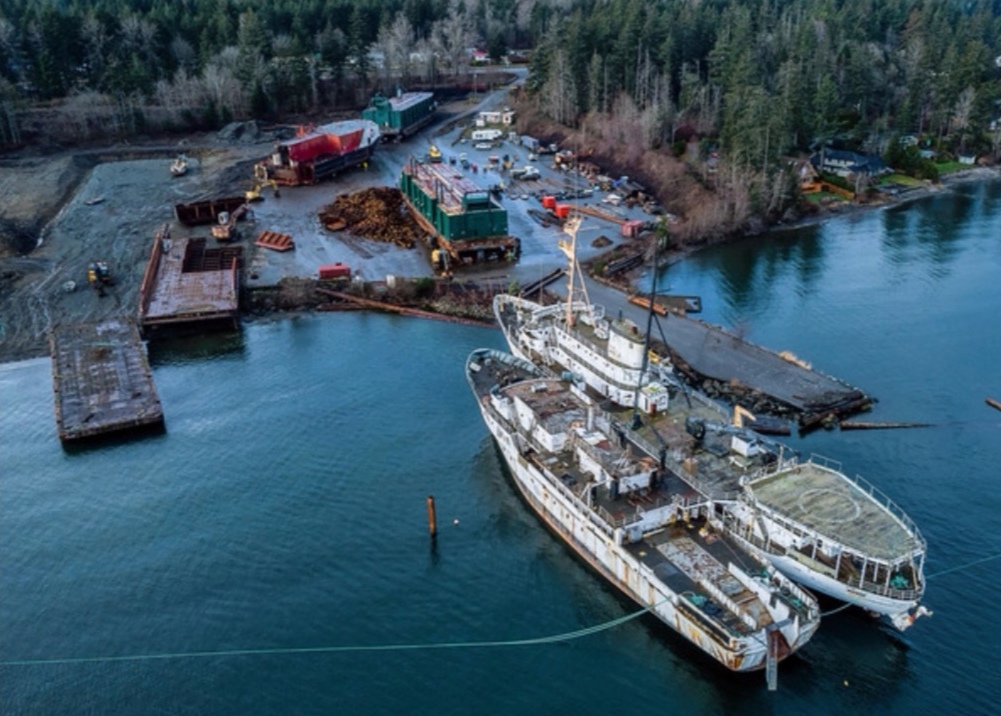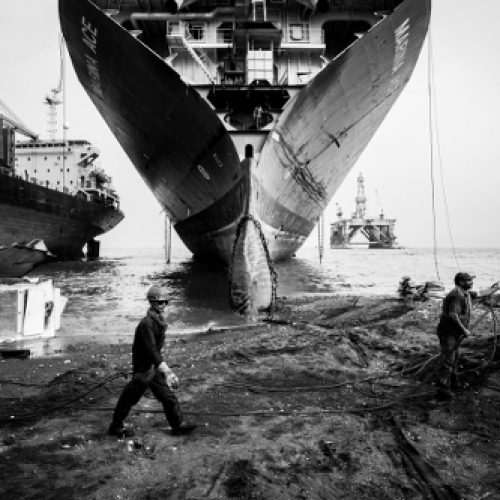Press Release – NGOs join local residents and First Nations in fight against toxic shipbreaking in British Columbia
Eighteen months have passed since local residents and K’ómoks First Nation (KFN) first raised concerns regarding scrapping operations at Union Bay, traditional unceded territory of First Nations within Baynes Sound, British Columbia, Canada. Now, the NGO Shipbreaking Platform joins them in calling on federal, provincial and regional authorities to make sure that the activities carried out by the operator, Deep Water Recovery Ltd (DWR), cease to cause harm to both local communities and the surrounding environment.
In December 2020, DWR converted a former log-sort location in an improvised shipbreaking yard to pull apart barges. The shipbreaking activities are in violation of district zoning bylaws, and, to date, the Comox Valley Regional District is still allowing for hazardous operations to take place only a few meters away from several residential houses and within an Ecologically and Biologically Significant Area (EBSA).
As highlighted in a recent report by WWF Canada, Baynes Sound is the highest ranked cumulative and spawning area for herring in the Strait of Georgia and is a critical feeding and overwintering area for water birds. It also supports the highest density of intertidal shellfish aquaculture in British Columbia, producing over half of all the shellfish cultured in the province. Locating a hazardous industry in such an ecologically sensitive zone is simply unacceptable.
Despite the foreign management of DWR stating that very stringent environmental plans are in place, drone footage and photos of the site tell a story of vessels taken apart without impermeable flooring and drainage systems in place. No Environmental Impact Assessment or public consultation prior to the dismantling activities having started was conducted.


Indeed, shipbreaking activities conducted without full containment can easily pollute land, water and air, as ships are almost invariably contaminated or containing harmful materials in their structures. Recent studies have shown how unregulated scrapping can cause carcinogenic air pollution, loss of marine biodiversity and soil contamination. Furthermore, lack of proper infrastructure and access to emergency equipment puts the lives of workers at risk in case of an accident during the dismantling process.
Currently, two former US Government vessels and a BC Ferries Corporation’s passenger ship are moored at Union Bay, possibly waiting to be scrapped. The NOAAS Miller Freeman (R 223), NOAAS Surveyor (S 132) and Queen of Burnaby, given their age and type, are likely to contain high amounts of toxic substances in their structures, including asbestos and PCBs.

The NGO Shipbreaking Platform has recently sent an official letter of concern to all Canadian competent bodies, and stands ready to further assist the affected communities in their fight for environmental justice.
Related news

Press Release – European ship owners on promotional tour in Alang – environmental and human rights activists denied access
Tomorrow, European ship owners, government representatives of France, Germany and Belgium, and the European Commission will visit the Alang shipbreaking yards. Despite several indications that NGOs, including… Read More

Press Release – Norwegian ship owner sentenced to prison
Last Friday, the Sunnhordland District Court in Norway sentenced ship owner Georg Eide to six months unconditional imprisonment.
... Read More
Press Release – Worst corporate dumpers asked to clean up their acts
Targeting sustainability and fleet managers, the NGO Shipbreaking Platform calls for the adoption of responsible ship recycling policies in letters sent to shipping companies standing out for… Read More

Press Release – NGOs urge Greece and Bangladesh to stop illegal beaching of ferry
Yet another passenger ship is heading towards the shipbreaking beaches of South Asia, in clear violation of European rules that are aimed at preventing the trade of… Read More

Platform News – Indian NGOs voice concerns as ship owners promote beaching
Indian NGOs voice serious concerns regarding the beaching of end-of-life vessels in Alang in reaction to the recent visit to the Alang shipbreaking yards organised by ECSA… Read More

Press Release – NGOs respond to legal threats by shipbreaking industry and withdraw from industry conference
On Monday, the NGO Shipbreaking Platform, an international coalition of labour, human rights and environmental organisations, withdrew their participation from the TradeWinds Ship Recycling Forum that starts… Read More

Platform News– Legal action taken by family of deceased worker following fatal incident at IŞIKSAN ship recycling yard in Turkiye
On 31 August last year, a fatal accident occurred during the dismantling of the Norwegian floating oil platform BIDEFORD DOLPHIN at the IŞIKSAN ship recycling yard in… Read More
